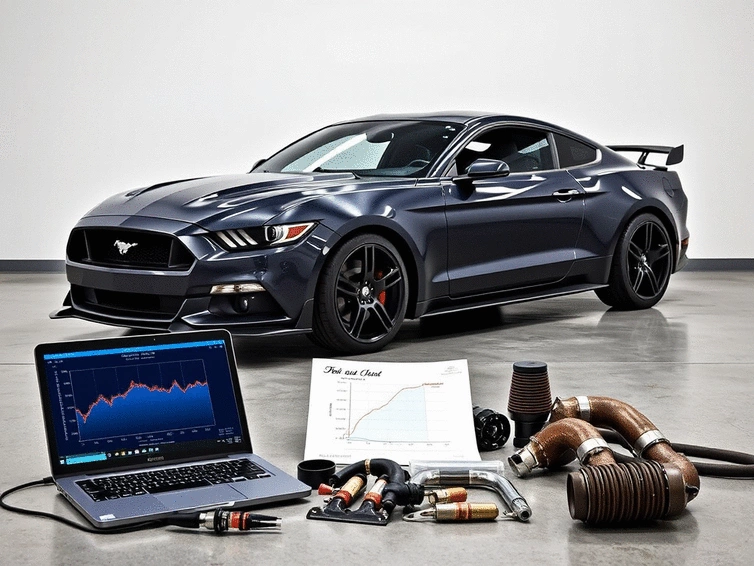1. Define Your Goals
Are you aiming for performance enhancements or better fuel efficiency? Clarity here guides your tuning path.

Curious about how performance tuning can transform your Ford driving experience? Understanding the intricacies of tuning can unlock your vehicle's potential, allowing you to achieve everything from enhanced speed to better fuel efficiency. Let's delve into the key insights you’ll gain from exploring performance tuning for Ford vehicles.
Unlock your Ford's potential by understanding key tuning concepts and steps. This visual guides you through the process, from defining goals to connecting with the tuning community.
Are you aiming for performance enhancements or better fuel efficiency? Clarity here guides your tuning path.
Invest in quality software and hardware like SCT Performance or Cobb Tuning for optimal results.
Familiarize yourself with Ford-specific features such as EcoBoost systems and cam phasing for effective tuning.
Conduct tests and fine-tune your settings to achieve optimal performance and desired driving experience.
Join forums, local shops, and events to learn and share experiences with other Ford enthusiasts.
Performance tuning is a hot topic among Ford enthusiasts, and for good reason! It’s all about unlocking the hidden potential of your vehicle and enhancing your driving experience. In essence, performance tuning modifies various aspects of your Ford to improve its power, efficiency, and overall performance. Why does it matter? Because simply put, a well-tuned Ford can transform your drive from ordinary to extraordinary!
As a lifelong Ford enthusiast myself, I can tell you that understanding performance tuning is essential if you want to maximize the capabilities of your ride. Whether you’re aiming for speed on the track or better fuel efficiency for your day-to-day commute, tuning can make a significant difference.
At its core, performance tuning involves adjusting the settings of your vehicle's Engine Control Unit (ECU) to enhance its performance. This process can dramatically affect not only the horsepower but also the torque and fuel efficiency of your Ford. How do you choose the right path for your tuning? Let’s break it down:
Understanding your goals and the specifics of your vehicle is crucial for successful tuning. Remember, it’s not just about making changes; it’s about making the right changes! For more in-depth information, you can explore the Cobb Tuning Wiki, which offers detailed insights into various tuning aspects.

As you dive into performance tuning, you'll encounter several key terms that are essential to the process. Familiarizing yourself with these can help you make informed decisions:
By grasping these terms, you’ll be better equipped to engage in discussions about tuning and understand the modifications being made to your Ford.
Engine tuning principles revolve around optimizing the various components of your vehicle’s engine to achieve the best possible performance. This can include everything from adjusting fuel mixtures to enhancing air intake systems. For valuable tips on engine building and tuning, consider reviewing the comprehensive Ford Performance Parts engine building tips.
Here’s what to keep in mind:
Keeping these principles in mind will ensure that your tuning efforts yield the best results. Remember, tuning isn’t just about raw power; it’s about achieving a balance that enhances the driving experience! Further guidance on installation and tuning can be found in the Ford Performance Engine Installation and Tuning Tips PDF.
Before diving into tuning, take the time to research and understand your specific Ford model's tuning potential. Each model has unique characteristics that can influence tuning strategies. Joining Ford enthusiast forums can provide invaluable insights and experiences from fellow tuners who have successfully navigated the tuning landscape!

As we wrap up our journey into the world of Ford performance tuning, it’s important to remember the fundamental concepts we've explored. Performance tuning is not just about boosting horsepower; it’s about understanding your vehicle and making it truly yours. From ECU remapping to selecting the right intake systems, each step plays a crucial role in maximizing your Ford's potential.
Here’s a quick recap of the steps to get started with tuning:
With these key points in mind, you’ll be well on your way to transforming your Ford into the powerhouse you’ve always dreamed of!
The world of performance tuning is ever-evolving, and there's always something new to learn! As a passionate Ford enthusiast, I encourage you to keep diving deeper into the nuances of tuning. Explore different modifications, stay updated with the latest technologies, and don't hesitate to experiment!
Remember, each tuning journey is unique, and every small tweak can lead to significant improvements. Embrace the learning process and enjoy the thrill of enhancing your vehicle's performance!
If you're eager to expand your knowledge on Ford performance tuning, there’s a wealth of resources available. Here’s where you can find valuable information:
These resources can provide insights and tips that enhance your tuning skills and boost your confidence!
At Ford Power, we love hearing from fellow enthusiasts! I invite you to share your tuning experiences, whether it’s a triumph or a hurdle. Your stories not only enrich our community but also help others who may be on a similar journey. Don’t hesitate to reach out through comments or social media—let's learn from one another!
Finally, connecting with like-minded individuals can truly enhance your tuning journey. Look for local tuning shops that specialize in Ford vehicles, as they can offer personalized advice and hands-on assistance.
Additionally, consider attending automotive events or meetups in your area. This is a fantastic way to network, share ideas, and discover new tuning methods. Who knows? You might find your next inspiration at a local car show!
Here is a quick recap of the important points discussed in the article:
2026 Ford Mustang Redefines Performance Driving

Are you ready to experience the thrill of the 2026 Ford Mustang? This latest model is not just a car
Ford Warranty and Modifications Guide

What if you could customize your Ford without worrying about voiding your warranty? Understanding th
Buying a Used Ford: Insights
2026 Ford Mustang Redefines Performance Driving
Ford Warranty and Modifications Guide
Maximize Your Ford Lightning's Performance
Restoring Ford Classics: Keep It Original